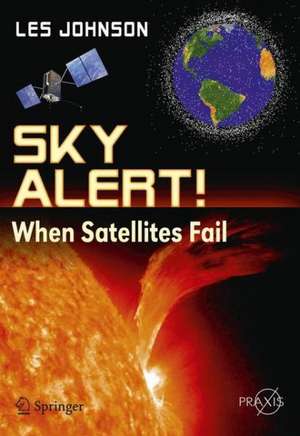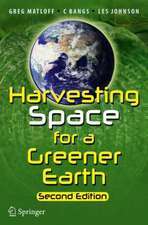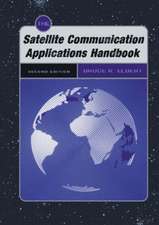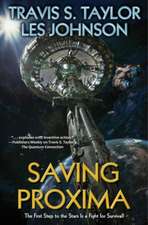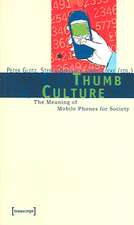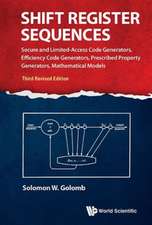Sky Alert!: When Satellites Fail: Springer Praxis Books
Autor Les Johnsonen Limba Engleză Paperback – 26 feb 2013
The book opens with a consideration of how our space assets might be lost in the first place: through orbital debris, war, and solar storms. The author then looks at what would happen if our satellites were lost, including the effect on weather forecasting, and the Global Positioning System, explaining GPS in detail and its importance to the military, including spy satellites and military reconnaissance, commerce, civilians, communications and remote sensing – both resource monitoring and locating and environmental monitoring and science. The effects of losing such assets as the International Space Station as well as such research satellites as the Hubble Space Telescope or the Chandra X-Ray Observatory are also considered.
Part III of the book looks at how we can protect our satellites, preparing for the worst, reducing the growth and amount of orbital debris, preventing acts of war in space and hardening against space radiation. The book ends on an optimistic note: most spacefaring nations are now working together to develop new technologies to reduce the threat posed by orbital debris and in-space nuclear detonations and treaties exist to limit the development and use of weapons in space. Finally, it is hoped that it will not be long before we will be able to better predict and take precautions against solar storms.
The global economy has now become so dependent upon satellites that their loss would be devastating – to the economy, to national security, and potentially, to the day-to-day survival of those who live in the world’s most advancedeconomies.
Din seria Springer Praxis Books
-
 Preț: 294.46 lei
Preț: 294.46 lei -
 Preț: 223.45 lei
Preț: 223.45 lei -
 Preț: 193.12 lei
Preț: 193.12 lei -
 Preț: 167.85 lei
Preț: 167.85 lei -
 Preț: 288.98 lei
Preț: 288.98 lei -
 Preț: 323.74 lei
Preț: 323.74 lei -
 Preț: 401.38 lei
Preț: 401.38 lei -
 Preț: 264.12 lei
Preț: 264.12 lei - 8%
 Preț: 513.00 lei
Preț: 513.00 lei -
 Preț: 190.01 lei
Preț: 190.01 lei -
 Preț: 218.16 lei
Preț: 218.16 lei -
 Preț: 312.06 lei
Preț: 312.06 lei - 17%
 Preț: 414.04 lei
Preț: 414.04 lei -
 Preț: 216.41 lei
Preț: 216.41 lei -
 Preț: 261.49 lei
Preț: 261.49 lei -
 Preț: 264.35 lei
Preț: 264.35 lei -
 Preț: 167.63 lei
Preț: 167.63 lei -
 Preț: 284.81 lei
Preț: 284.81 lei -
 Preț: 259.08 lei
Preț: 259.08 lei -
 Preț: 305.47 lei
Preț: 305.47 lei -
 Preț: 244.14 lei
Preț: 244.14 lei -
 Preț: 227.85 lei
Preț: 227.85 lei -
 Preț: 285.25 lei
Preț: 285.25 lei -
 Preț: 295.56 lei
Preț: 295.56 lei -
 Preț: 357.17 lei
Preț: 357.17 lei -
 Preț: 275.79 lei
Preț: 275.79 lei -
 Preț: 257.08 lei
Preț: 257.08 lei -
 Preț: 349.71 lei
Preț: 349.71 lei -
 Preț: 272.45 lei
Preț: 272.45 lei -
 Preț: 270.27 lei
Preț: 270.27 lei - 8%
 Preț: 456.51 lei
Preț: 456.51 lei -
 Preț: 352.34 lei
Preț: 352.34 lei - 8%
 Preț: 394.80 lei
Preț: 394.80 lei -
 Preț: 320.65 lei
Preț: 320.65 lei -
 Preț: 325.29 lei
Preț: 325.29 lei -
 Preț: 253.11 lei
Preț: 253.11 lei -
 Preț: 192.86 lei
Preț: 192.86 lei -
 Preț: 313.40 lei
Preț: 313.40 lei -
 Preț: 150.51 lei
Preț: 150.51 lei -
 Preț: 233.34 lei
Preț: 233.34 lei -
 Preț: 286.78 lei
Preț: 286.78 lei -
 Preț: 212.01 lei
Preț: 212.01 lei -
 Preț: 366.83 lei
Preț: 366.83 lei -
 Preț: 299.99 lei
Preț: 299.99 lei -
 Preț: 232.27 lei
Preț: 232.27 lei -
 Preț: 284.58 lei
Preț: 284.58 lei -
 Preț: 212.45 lei
Preț: 212.45 lei -
 Preț: 159.81 lei
Preț: 159.81 lei -
 Preț: 349.48 lei
Preț: 349.48 lei - 20%
 Preț: 2061.61 lei
Preț: 2061.61 lei
Preț: 239.28 lei
Nou
Puncte Express: 359
Preț estimativ în valută:
45.79€ • 47.71$ • 37.91£
45.79€ • 47.71$ • 37.91£
Carte tipărită la comandă
Livrare economică 03-17 aprilie
Preluare comenzi: 021 569.72.76
Specificații
ISBN-13: 9781461418290
ISBN-10: 1461418291
Pagini: 212
Ilustrații: XI, 199 p. 80 illus., 55 illus. in color.
Dimensiuni: 168 x 240 x 11 mm
Greutate: 0.48 kg
Ediția:2013
Editura: Springer
Colecția Springer
Seriile Springer Praxis Books, Popular Science
Locul publicării:New York, NY, United States
ISBN-10: 1461418291
Pagini: 212
Ilustrații: XI, 199 p. 80 illus., 55 illus. in color.
Dimensiuni: 168 x 240 x 11 mm
Greutate: 0.48 kg
Ediția:2013
Editura: Springer
Colecția Springer
Seriile Springer Praxis Books, Popular Science
Locul publicării:New York, NY, United States
Public țintă
Popular/generalCuprins
From the Contents: Part I: How we might lose our Satellites.- Orbital Debris.- War.-Part II: If we were to lose our satellites.- The Global Positioning System (Military Uses).- Economic Fallout from the Losing the Global Positioning System.- GPS and the Average Person.- Spy Satellites and Military Reconnaissance.- Communications.- Weather Forecasting.- Remote Sensing - Resource Monitoring and Locating.- Remote Sensing - Environmental Monitoring and Science.- Part III: What Can We Do?.- Reduce the Growth of Orbital Debris.
Notă biografică
Les Johnson is the Deputy Manager for NASA’s Advanced Concepts Office at the George C. Marshall Space Flight Center in Huntsville, Alabama. He is also the co-author of three published popular science books, Living Off the Land in Space (Springer/Copernicus 2007), the 2008 PROSE Award finalist, Solar Sails - A Novel Approach to Interplanetary Travel (Springer/Copernicus 2008), and Paradise Regained – The Regreening of Earth (Springer/Copernicus 2009). He is also the co-author of the science fiction novel, Back to the Moon (Baen/2010).
In the early 2000s, Les was NASA’s Manager for Interstellar Propulsion Research and later managed the $100M In-Space Propulsion Technology Program. He has worked for NASA since 1990 and has served in various technical and management roles.
Les is the NASA co-investigator on the Japanese space tether experiment “T-Rex” that flew in late 2010. He was the Chief Scientist for the ProSEDS space experiment, twice received NASA’s Exceptional Achievement Medal, and holds 3 space technology patents.
Les earned his Master’s degree at Vanderbilt University in Nashville, TN and his Bachelor’s Degree from Transylvania University in Lexington, KY. He has numerous peer-reviewed publications and was published in Analog. He is a frequent contributor to the Journal of the British Interplanetary Society and a member of the National Space Society, The World Future Society, and MENSA.
In the early 2000s, Les was NASA’s Manager for Interstellar Propulsion Research and later managed the $100M In-Space Propulsion Technology Program. He has worked for NASA since 1990 and has served in various technical and management roles.
Les is the NASA co-investigator on the Japanese space tether experiment “T-Rex” that flew in late 2010. He was the Chief Scientist for the ProSEDS space experiment, twice received NASA’s Exceptional Achievement Medal, and holds 3 space technology patents.
Les earned his Master’s degree at Vanderbilt University in Nashville, TN and his Bachelor’s Degree from Transylvania University in Lexington, KY. He has numerous peer-reviewed publications and was published in Analog. He is a frequent contributor to the Journal of the British Interplanetary Society and a member of the National Space Society, The World Future Society, and MENSA.
Textul de pe ultima copertă
How much do we depend on space satellites? Defense, travel, agriculture, weather forecasting, mobile phones and broadband, commerce...the list seems endless. But what would our live be like if the unimaginable happened and, by accident or design, those space assets disappeared?
Sky Alert! explores what our world would be like, looking in turn at areas where the loss could have catastrophic effects. The book
- demonstrates our dependence on space technology and satellites;
- outlines the effect on our economy, defense, and daily lives if satellites and orbiting spacecraft were destroyed;
- illustrates the danger of dead satellites, spent rocket stages, and space debris colliding with a functioning satellites;
- demonstrates the threat of dramatically increased radiation levels associated with geomagnetic storms;
- introduces space as a potential area of conflict between nations.
Sky Alert! explores what our world would be like, looking in turn at areas where the loss could have catastrophic effects. The book
- demonstrates our dependence on space technology and satellites;
- outlines the effect on our economy, defense, and daily lives if satellites and orbiting spacecraft were destroyed;
- illustrates the danger of dead satellites, spent rocket stages, and space debris colliding with a functioning satellites;
- demonstrates the threat of dramatically increased radiation levels associated with geomagnetic storms;
- introduces space as a potential area of conflict between nations.
Caracteristici
Outlines the effect on our economy, defense, and daily lives if satellites and orbiting spacecraft were destroyed Explores the importance of space assets and what would happen if they were lost Introduces space as a potential area of conflict between nations
